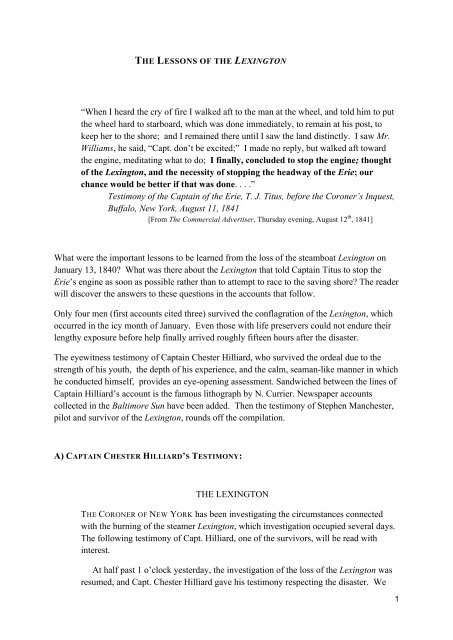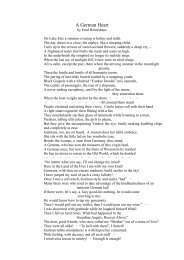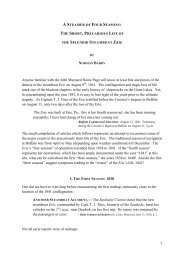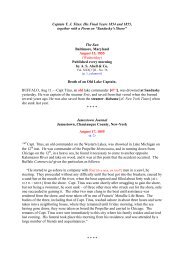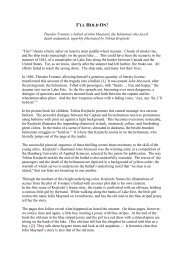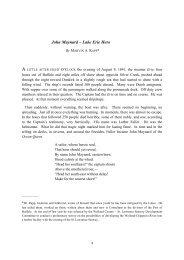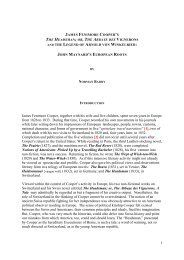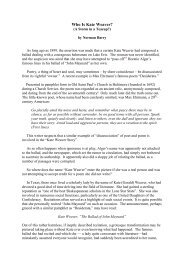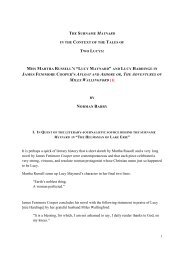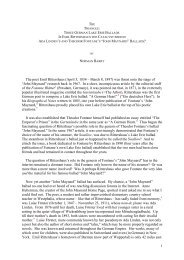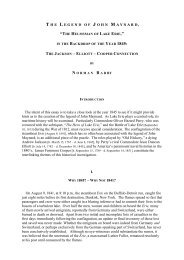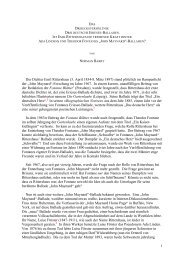The Lessons of the Lexington. - John Maynard Home Page
The Lessons of the Lexington. - John Maynard Home Page
The Lessons of the Lexington. - John Maynard Home Page
Create successful ePaper yourself
Turn your PDF publications into a flip-book with our unique Google optimized e-Paper software.
THE LESSONS OF THE LEXINGTON<br />
“When I heard <strong>the</strong> cry <strong>of</strong> fire I walked aft to <strong>the</strong> man at <strong>the</strong> wheel, and told him to put<br />
<strong>the</strong> wheel hard to starboard, which was done immediately, to remain at his post, to<br />
keep her to <strong>the</strong> shore; and I remained <strong>the</strong>re until I saw <strong>the</strong> land distinctly. I saw Mr.<br />
Williams, he said, “Capt. don’t be excited;” I made no reply, but walked aft toward<br />
<strong>the</strong> engine, meditating what to do; I finally, concluded to stop <strong>the</strong> engine; thought<br />
<strong>of</strong> <strong>the</strong> <strong>Lexington</strong>, and <strong>the</strong> necessity <strong>of</strong> stopping <strong>the</strong> headway <strong>of</strong> <strong>the</strong> Erie; our<br />
chance would be better if that was done. . . .”<br />
Testimony <strong>of</strong> <strong>the</strong> Captain <strong>of</strong> <strong>the</strong> Erie, T. J. Titus, before <strong>the</strong> Coroner’s Inquest,<br />
Buffalo, New York, August 11, 1841<br />
[From <strong>The</strong> Commercial Advertiser, Thursday evening, August 12 th , 1841]<br />
What were <strong>the</strong> important lessons to be learned from <strong>the</strong> loss <strong>of</strong> <strong>the</strong> steamboat <strong>Lexington</strong> on<br />
January 13, 1840? What was <strong>the</strong>re about <strong>the</strong> <strong>Lexington</strong> that told Captain Titus to stop <strong>the</strong><br />
Erie’s engine as soon as possible ra<strong>the</strong>r than to attempt to race to <strong>the</strong> saving shore? <strong>The</strong> reader<br />
will discover <strong>the</strong> answers to <strong>the</strong>se questions in <strong>the</strong> accounts that follow.<br />
Only four men (first accounts cited three) survived <strong>the</strong> conflagration <strong>of</strong> <strong>the</strong> <strong>Lexington</strong>, which<br />
occurred in <strong>the</strong> icy month <strong>of</strong> January. Even those with life preservers could not endure <strong>the</strong>ir<br />
lengthy exposure before help finally arrived roughly fifteen hours after <strong>the</strong> disaster.<br />
<strong>The</strong> eyewitness testimony <strong>of</strong> Captain Chester Hilliard, who survived <strong>the</strong> ordeal due to <strong>the</strong><br />
strength <strong>of</strong> his youth, <strong>the</strong> depth <strong>of</strong> his experience, and <strong>the</strong> calm, seaman-like manner in which<br />
he conducted himself, provides an eye-opening assessment. Sandwiched between <strong>the</strong> lines <strong>of</strong><br />
Captain Hilliard’s account is <strong>the</strong> famous lithograph by N. Currier. Newspaper accounts<br />
collected in <strong>the</strong> Baltimore Sun have been added. <strong>The</strong>n <strong>the</strong> testimony <strong>of</strong> Stephen Manchester,<br />
pilot and survivor <strong>of</strong> <strong>the</strong> <strong>Lexington</strong>, rounds <strong>of</strong>f <strong>the</strong> compilation.<br />
A) CAPTAIN CHESTER HILLIARD’S TESTIMONY:<br />
THE LEXINGTON<br />
THE CORONER OF NEW YORK has been investigating <strong>the</strong> circumstances connected<br />
with <strong>the</strong> burning <strong>of</strong> <strong>the</strong> steamer <strong>Lexington</strong>, which investigation occupied several days.<br />
<strong>The</strong> following testimony <strong>of</strong> Capt. Hilliard, one <strong>of</strong> <strong>the</strong> survivors, will be read with<br />
interest.<br />
At half past 1 o’clock yesterday, <strong>the</strong> investigation <strong>of</strong> <strong>the</strong> loss <strong>of</strong> <strong>the</strong> <strong>Lexington</strong> was<br />
resumed, and Capt. Chester Hilliard gave his testimony respecting <strong>the</strong> disaster. We<br />
1
publish it in full, we say verbatim, with <strong>the</strong> exception <strong>of</strong> some frivolous questions put<br />
to him after <strong>the</strong> evidence had closed by some <strong>of</strong> <strong>the</strong> jurors. We advise a careful<br />
perusal <strong>of</strong> Captain Hilliard’s testimony. It will be found graphic, concise, and highly<br />
interesting. It clearly establishes one thing, that <strong>the</strong> deplorable loss <strong>of</strong> life is mainly to<br />
be attributed to <strong>the</strong> panic <strong>of</strong> <strong>the</strong> passengers, and to <strong>the</strong> insane destruction <strong>of</strong> <strong>the</strong> boats.<br />
Captain Hilliard examined—I am 24 years <strong>of</strong> age. I reside at Port Ann, N. Y.<br />
Have followed <strong>the</strong> sea eight years. First went before <strong>the</strong> mast. I <strong>the</strong>n made a voyage<br />
as second mate. <strong>The</strong>n as chief mate <strong>of</strong> <strong>the</strong> Mississippi. Have since made a voyage in<br />
her as Captain to New Orleans. Arrived here in her from that port about 4 weeks since<br />
come Saturday. Went on board <strong>the</strong> <strong>Lexington</strong> a week ago last Monday, <strong>the</strong> 13 th<br />
instant. Went on board about 3 o’clock P.M. to go to Stonington. I was bound to<br />
Norwich.<br />
By Mr. Wheeler—Have no family. Have bro<strong>the</strong>rs and sisters. No parents living.<br />
Do not know <strong>the</strong> number <strong>of</strong> passengers on board <strong>the</strong> <strong>Lexington</strong>. Heard <strong>the</strong>re were 150,<br />
but think, from what I saw at table, that this estimate is large. Paid no attention to <strong>the</strong><br />
stowage <strong>of</strong> <strong>the</strong> boat. I think <strong>the</strong> greater part <strong>of</strong> <strong>the</strong> freight consisted <strong>of</strong> cotton. It was<br />
stowed under <strong>the</strong> promenade deck. Did not observe any o<strong>the</strong>r particular kind <strong>of</strong><br />
freight. <strong>The</strong>re was space left to pass beside <strong>the</strong> wheelhouse, but cannot say if more<br />
than one person could pass at a time. <strong>The</strong> cotton was stowed up against <strong>the</strong><br />
wheelhouse. Went forward on <strong>the</strong> forecastle. Three baggage cars were on it. I<br />
observed nothing more. <strong>The</strong> life boat was on <strong>the</strong> promenade deck just forward <strong>of</strong> <strong>the</strong><br />
wheelhouse on <strong>the</strong> starboard side. Saw <strong>the</strong>m clearing her away. Before this time I<br />
took no notice <strong>of</strong> her. She was covered with canvass, I suppose fitted for <strong>the</strong> purpose.<br />
Saw it torn <strong>of</strong>f her. Saw both quarter boats lowered away. Did not take particular<br />
notice <strong>of</strong> <strong>the</strong>m before. We took supper at about 6 o’clock P.M. Can’t make an<br />
estimate <strong>of</strong> <strong>the</strong> cabin. Three tables were set that went half <strong>the</strong> length <strong>of</strong> <strong>the</strong> cabin.<br />
Near <strong>the</strong> centre <strong>of</strong> <strong>the</strong> cabin were stoves. <strong>The</strong> tables were full—some had to wait<br />
until <strong>the</strong>y set a second table. Observed nothing wrong in <strong>the</strong> arrangements <strong>of</strong> <strong>the</strong> boat.<br />
She was going 16 or 17 knots. <strong>The</strong> tables had been cleared, probably an hour before<br />
<strong>the</strong> alarm. <strong>The</strong> berths were taken up in <strong>the</strong> usual manner. Was just on <strong>the</strong> point <strong>of</strong><br />
turning into my berth when <strong>the</strong> alarm was given. Had my coat and boots <strong>of</strong>f. My<br />
berth was <strong>the</strong> third length aft from <strong>the</strong> stairs <strong>of</strong> <strong>the</strong> companion-way. Think <strong>the</strong> No. 49.<br />
At first I did not apprehend any thing serious. I slipped my cap, coat, and boots on,<br />
and threw my overcoat over my arm, and ran up <strong>the</strong> companion way. When I got on<br />
deck, I discovered <strong>the</strong> edging <strong>of</strong> <strong>the</strong> smoke pipe on fire, and I should think <strong>the</strong><br />
promenade deck over head was also on fire. <strong>The</strong> general body <strong>of</strong> passengers were<br />
making a rush for <strong>the</strong> boats. <strong>The</strong> after part <strong>of</strong> <strong>the</strong> casing was entirely in flames. <strong>The</strong><br />
wind blew aft and carried <strong>the</strong> flames that way. <strong>The</strong> casing might have taken fire in<br />
front, but I cannot say.<br />
By a Juror. Don’t know where <strong>the</strong> boat took fire. Don’t know if <strong>the</strong> fire was below<br />
<strong>the</strong> main deck.—<strong>The</strong> fire might have taken over <strong>the</strong> boilers, and run up to <strong>the</strong> chimney<br />
casing.<br />
2
By Mr. Wheeler. Don’t know any thing about <strong>the</strong> steam chimney spoken <strong>of</strong> by a<br />
former witness.—<strong>The</strong>re might have been such a thing, but I cannot say. At this time I<br />
did not see any thing <strong>of</strong> Capt. Childs. At <strong>the</strong> time I first discovered <strong>the</strong> fire, I saw no<br />
appearances <strong>of</strong> <strong>the</strong> buckets having been used. I saw buckets on board but could not<br />
say how many. Think <strong>the</strong>y did not get <strong>the</strong> fire engine at work. My attention, when I<br />
first came on deck, was turned to <strong>the</strong> quarter boats—<strong>the</strong>y were <strong>the</strong>n full <strong>of</strong> passengers.<br />
<strong>The</strong> passengers seemed phrenzied, and determined by a stupid obstinacy to destroy<br />
<strong>the</strong>mselves. I went to <strong>the</strong> starboard boat, which <strong>the</strong>y were about to lower away, and<br />
which <strong>the</strong>y did lower away. When near <strong>the</strong> water—I think <strong>the</strong> stern touched <strong>the</strong><br />
water—some one cut <strong>the</strong> bow tackle. I don’t think it could have been unhooked. <strong>The</strong><br />
boat <strong>the</strong>n running 12 or 14 knots an hour would have prevented it. <strong>The</strong> starboard boat<br />
immediately filled with water. She was full <strong>of</strong> people—about 20 persons were in her.<br />
<strong>The</strong> boat went astern very quick, and went down. I ran over to <strong>the</strong> o<strong>the</strong>r boat, which<br />
<strong>the</strong>y lowered, and which went down pretty much in <strong>the</strong> same way, only she was not so<br />
full <strong>of</strong> water. Don’t know if <strong>the</strong>re were any <strong>of</strong> <strong>the</strong> <strong>of</strong>ficers or crew about this boat.<br />
<strong>The</strong>re was not a painter attached to <strong>the</strong> boat, or, if so, it had parted. By this time <strong>the</strong><br />
fire had got such headway I had pretty much made up my mind <strong>the</strong> boat was a gone<br />
case, and thought <strong>the</strong> only chance was to run her ashore.<br />
Went for this purpose to <strong>the</strong> wheelhouse in hopes <strong>of</strong> seeing Capt. Childs, as I<br />
supposed he would be <strong>the</strong>re. Saw Capt. Childs <strong>the</strong>re. Told him <strong>the</strong> best thing he could<br />
do was to run <strong>the</strong> boat ashore as fast as possible. Capt. C. said “<strong>the</strong> boat already<br />
headed for land.” By this time <strong>the</strong> fire began to come up <strong>the</strong> sides and through <strong>the</strong><br />
promenade deck. <strong>The</strong> wheelhouse was filled with smoke. I could not see who was in<br />
<strong>the</strong> wheelhouse and who was not.—<strong>The</strong>re were two or three persons in <strong>the</strong> vicinity<br />
<strong>of</strong> <strong>the</strong> life boat. <strong>The</strong>ir attention was <strong>the</strong>n directed to her. I said, “if you mean to do<br />
any thing with her you must do it very quick.” I was apprehensive <strong>the</strong> promenade<br />
deck would soon fall in. I helped tear <strong>the</strong> tarpaulin <strong>of</strong>f her. But I had no intention <strong>of</strong><br />
going in her, for I knew that as soon as she touched <strong>the</strong> main deck rail, <strong>the</strong>y would<br />
crowd into her and swamp her, as <strong>the</strong>y had done <strong>the</strong> o<strong>the</strong>r boats. What became <strong>of</strong> her<br />
I cannot say. I think <strong>the</strong>y launched her. I <strong>the</strong>n quitted <strong>the</strong> promenade deck as <strong>the</strong> fire<br />
commenced bursting up around <strong>the</strong> wheelhouse.—Went aft and descended to <strong>the</strong> main<br />
deck. Saw <strong>the</strong>m at work <strong>the</strong>re with <strong>the</strong> hose, I think <strong>of</strong> her force pump. I did not<br />
know before this that she had a force pump on board. It was so thick with smoke I<br />
could scarcely see what <strong>the</strong>y were about, and <strong>the</strong>y were soon forced to leave <strong>of</strong>f work.<br />
By this time <strong>the</strong> communication was entirely cut <strong>of</strong>f between <strong>the</strong> fore and aft part <strong>of</strong><br />
<strong>the</strong> steamboat.<br />
Up to this time, twenty minutes had probably elapsed. <strong>The</strong> steam engine had<br />
stopped. I do not think <strong>the</strong> engine ran more than 15 or 20 minutes from <strong>the</strong> first alarm.<br />
I recommended <strong>the</strong> deck hands to throw <strong>the</strong> cotton overboard. <strong>The</strong>re were not many<br />
passengers left at this time. I told <strong>the</strong> passengers <strong>the</strong>y must now do something for<br />
<strong>the</strong>mselves, and do it soon. <strong>The</strong> hands threw over 10 or 12 bales <strong>of</strong> cotton, and I lent<br />
<strong>the</strong>m a hand. Some <strong>of</strong> <strong>the</strong> passengers who had been hanging to <strong>the</strong> chains made for <strong>the</strong><br />
cotton as it was thrown overboard. We threw over all <strong>the</strong> cotton on <strong>the</strong> larboard side<br />
3
not on fire. I <strong>the</strong>n cut a piece <strong>of</strong> line and spanned a bale <strong>of</strong> cotton with it. I believe it<br />
was <strong>the</strong> last bale not on fire. It was a snugly packed square bale. A bale <strong>of</strong> cotton is<br />
about three feet wide, 1 1-2 thick, and four feet long. One <strong>of</strong> <strong>the</strong> firemen—<strong>the</strong> same<br />
who went on <strong>the</strong> bale with me—lent me a hand to get this bale over <strong>the</strong> rail. We took<br />
about four fathom [1 fathom = 6 ft.] <strong>of</strong> <strong>the</strong> rope I had cut, and took a round turn around<br />
<strong>the</strong> steam boat’s rail. We both got on <strong>the</strong> cotton and lowered it in <strong>the</strong> water, setting<br />
astride, facing each o<strong>the</strong>r. <strong>The</strong> boat <strong>the</strong>n lay broadside to <strong>the</strong> wind, her head probably<br />
to land, but cannot say. We lay under her lee. As soon as we touched <strong>the</strong> water, we<br />
let go, and coiled <strong>the</strong> rope on to <strong>the</strong> bale. <strong>The</strong> bale was one third out <strong>of</strong> <strong>the</strong> water. We<br />
did not lash ourselves to <strong>the</strong> bale. <strong>The</strong> wind was fresh, and <strong>the</strong> steamboat drifted<br />
considerably. We found much difficulty in getting along. My companion seemed<br />
unwilling to leave. He wished to hold on to <strong>the</strong> guard, but I was determined to get<br />
away before we got burned to death, and I shoved <strong>the</strong> bale along round <strong>the</strong> stern. <strong>The</strong><br />
moment we were clear <strong>of</strong> <strong>the</strong> boat, she drifted away from us about one and a half<br />
knots per hour. This was just eight o’clock P.M. Took my watch out and looked at<br />
<strong>the</strong> time. As we left <strong>the</strong> boat I took out a piece <strong>of</strong> board which I afterwards used as a<br />
paddle.<br />
“Awful Conflagration <strong>of</strong> <strong>the</strong> Steam Boat LEXINGTON In Long Island Sound on Monday Eve g , Jan y . 13 th ,<br />
1840, by which melancholy occurrence, over 100 PERSONS PERISHED.”<br />
(Lithographed and Published by N. Currier)<br />
4
ON THE EVENING <strong>of</strong> January 13, 1840, <strong>the</strong> steamboat <strong>Lexington</strong>, bound from New York<br />
for Stonington, Connecticut, with a crew <strong>of</strong> forty and nearly one hundred passengers, caught<br />
fire on Long Island Sound. <strong>The</strong> wooden vessel burned like tinder, <strong>the</strong> lifeboats, badly<br />
handled, capsized on being launched, and <strong>the</strong> pilot’s effort to run <strong>the</strong> ship ashore failed when<br />
<strong>the</strong> engines stopped two miles from <strong>the</strong> coast. Occupants <strong>of</strong> <strong>the</strong> vessel had to choose<br />
between burning to death and drowning in frigid water. Only a handful survived.<br />
Three days later, when New York was still humming with conflicting tales <strong>of</strong> <strong>the</strong> disaster,<br />
<strong>the</strong>re appeared what was perhaps <strong>the</strong> first illustrated extra in history. Headed “<strong>The</strong> Extra<br />
Sun,” it bears a finely drawn and violently realistic picture <strong>of</strong> <strong>the</strong> flaming vessel. Figures can<br />
be seen lining <strong>the</strong> rails fore and aft and leaping into <strong>the</strong> water while a starboard lifeboat spills<br />
its occupants into <strong>the</strong> sea after a clumsy launching. In <strong>the</strong> foreground frenzied women and<br />
men in stovepipe hats take a precarious refuge on <strong>the</strong> cotton bales that were <strong>the</strong> ship’s chief<br />
cargo and cling desperately to bits <strong>of</strong> debris. . . . .<br />
“<strong>The</strong> Extra Sun” was a sensation. It received columns <strong>of</strong> newspaper notices. Newsboys<br />
hawked it in <strong>the</strong> streets. <strong>The</strong> presses ran night and day to supply <strong>the</strong> demand. Copies were<br />
shipped to o<strong>the</strong>r cities, and overnight N. Currier became a national institution.<br />
- Harry T. Peters, Currier & Ives, Printmakers to <strong>the</strong> American People (Garden City, New York:<br />
Doubleday, Doran & Co., Inc., 1942), p. 1<br />
By a Juror. When we left <strong>the</strong> boat I did not see much, being obliged to keep <strong>the</strong> end<br />
<strong>of</strong> <strong>the</strong> cotton to <strong>the</strong> sea. When we came round <strong>the</strong> stern, <strong>the</strong> ladies cabin was all on<br />
fire. I saw a lady and ano<strong>the</strong>r person on board. What made me take such notice <strong>of</strong> <strong>the</strong><br />
lady was, that <strong>the</strong>re was a child floating on <strong>the</strong> water astern, and as we passed round<br />
<strong>the</strong> stern, we passed close to this child as it lay floating on its back. <strong>The</strong> lady seeing us<br />
pass her child, cried out to us to save it. I think this was a female child.—It had on a<br />
bonnet and a cloak. We did not attempt to take it from <strong>the</strong> water, for it was perfectly<br />
dead.<br />
By a Juror. I thought <strong>the</strong> child a female from its apparel. We passed so close that I<br />
could have put my hand upon it, but <strong>the</strong> sea was rough, and I had as much as I could<br />
attend to, to keep my bale from upsetting. <strong>The</strong> sea washed over us. We were about up<br />
to <strong>the</strong> waist.<br />
By Mr. Wheeler. <strong>The</strong> boat went down at 8 A.M. not 10 minutes ei<strong>the</strong>r way. We<br />
were about a mile from her when she went down. It was thick wea<strong>the</strong>r when we first<br />
left <strong>the</strong> boat, but cleared up about 9 o’clock. We had a fine night. <strong>The</strong> moon shone,<br />
and went down at about half past 2 o’clock. I looked at my watch almost every half<br />
hour. It was a cold night and required exercise to keep warm.—Without exercise a<br />
person would have chilled through. About 4 A.M. <strong>the</strong> bale capsized with us. A heavy<br />
sea took <strong>the</strong> end and turned us right over.—We contrived to get on <strong>the</strong> bale again, <strong>the</strong><br />
5
former bottom side being <strong>the</strong>n uppermost. We lost <strong>the</strong> piece <strong>of</strong> board at this time, and<br />
<strong>the</strong> bale became unmanageable. My companion complained a good deal <strong>of</strong> <strong>the</strong> cold<br />
from <strong>the</strong> beginning. He kept fretting himself about his wife and family and friends<br />
when he should only have thought <strong>of</strong> saving himself. His name was Cox. His wife<br />
lived, he said at 71 Cherry street in this city. He seemed to think from <strong>the</strong> first that we<br />
should never get through and save our lives.<br />
Soon after we left <strong>the</strong> steamboat I gave him my vest, as he complained very much<br />
<strong>of</strong> cold. He had on only his flannel shirt, cap, pants, and boots. After we capsized he<br />
seemed to give up all hope. He remained on <strong>the</strong> bale afterwards about 2 or 2 1-2<br />
hours. <strong>The</strong> last half hour before he left <strong>the</strong> bale he became stupefied. He had lost all<br />
use <strong>of</strong> his hands, and could not hold on to any thing. I did all I could for him. I beat<br />
and pounded and rubbed him, to endeavor to keep his blood in circulation. <strong>The</strong> sea<br />
was still very rough, and I had <strong>of</strong>ten to take hold <strong>of</strong> <strong>the</strong> rope we reeved round <strong>the</strong> bale<br />
to keep on. <strong>The</strong> bale being broadside to <strong>the</strong> sea, now gave a lurch and my companion<br />
slipped <strong>of</strong>f. He sank immediately without a struggle. This was about half past 6<br />
o’clock, A.M. After <strong>the</strong> loss <strong>of</strong> my companion, I got more on to <strong>the</strong> middle <strong>of</strong> <strong>the</strong> bale<br />
to make it ride well, and drew my feet out <strong>of</strong> <strong>the</strong> water. I continued on <strong>the</strong> bale till<br />
taken <strong>of</strong>f four hours after, about 10 o’clock.<br />
About an hour before I was picked up, a sloop hove in sight, and to make <strong>the</strong>m<br />
observe me I waved my hat. I was pretty much chilled through. It was <strong>the</strong> sloop<br />
Merchant, Capt. Meeker, who deserves every praise for his conduct. He attempted to<br />
get out <strong>the</strong> night before, but could not for <strong>the</strong> ice. <strong>The</strong>y took out part <strong>of</strong> her cargo and<br />
got out a kedge anchor to endeavor to get over <strong>the</strong> bar, but it was to no purpose till <strong>the</strong><br />
tide rose. I did not see <strong>the</strong> sloop till she had got pretty well down to me. I do not<br />
know <strong>the</strong> time <strong>the</strong> sloop got out. She had to beat down, <strong>the</strong> wind being against her.<br />
<strong>The</strong> wind was I think SSW, nearly <strong>of</strong>f shore, when I saw <strong>the</strong> sloop. She had been to<br />
Southport and spoken <strong>the</strong> light-boat station <strong>the</strong>re to find out where <strong>the</strong> fire was. <strong>The</strong><br />
sloop took me on board, and <strong>the</strong> crew paid every attention to me. <strong>The</strong>y did all <strong>the</strong>y<br />
could. <strong>The</strong> captain took me down into <strong>the</strong> cabin, and <strong>the</strong> sloop went on her cruise.<br />
Some time after taking me on board, she picked up two persons alive, and two dead<br />
bodies. One was Capt. Manchester, <strong>the</strong> pilot <strong>of</strong> <strong>the</strong> <strong>Lexington</strong>, who I believe was on a<br />
part <strong>of</strong> <strong>the</strong> wheelhouse. <strong>The</strong> o<strong>the</strong>r was Mr. Charles Smith, who was on a bale <strong>of</strong><br />
cotton.<br />
My impression was, that Captain Manchester was on <strong>the</strong> bale <strong>of</strong> cotton, but from<br />
what Captain Comstock said yesterday, it could not be <strong>the</strong> case. Capt. Manchester<br />
was picked up first. I was below at <strong>the</strong> time when Captain Manchester and Mr. Smith<br />
were picked up. Both were picked up within a half an hour <strong>of</strong> each o<strong>the</strong>r. Captain<br />
Manchester was almost gone. Mr. Smith seemed somewhat better. Smith was a<br />
fireman. He belonged to Norwich, Conn. I believe that he and myself were <strong>the</strong> only<br />
two Norwich folks aboard <strong>the</strong> <strong>Lexington</strong>. After cruising about two hours, <strong>the</strong> sloop<br />
returned to <strong>the</strong> harbor, having picked up two dead bodies. One <strong>of</strong> <strong>the</strong>se was found on<br />
a piece <strong>of</strong> <strong>the</strong> wheelhouse, and one on a piece <strong>of</strong> <strong>the</strong> wreck. I did not return with <strong>the</strong><br />
sloop to Southport. <strong>The</strong> steamboat Nimrod overtook us about halfway. She came<br />
6
alongside, and I went on board <strong>of</strong> her. She was bound for Bridgeport. I was set<br />
ashore <strong>the</strong>re, and went to Captain Davis, who is an old acquaintance <strong>of</strong> mine. I stayed<br />
<strong>the</strong>re that night. Went on board <strong>the</strong> Nimrod <strong>the</strong> next morning, at 8 o’clock, and came<br />
to New York.<br />
Mr. Wheeler said he should wish to ask a question respecting Capt. Childs, which<br />
was, how he appeared to be in his manner when Capt. Hilliard spoke to him near <strong>the</strong><br />
wheelhouse. Capt. Hilliard replied, “When I went to <strong>the</strong> wheelhouse and saw Captain<br />
Childs, he seemed confused. He said nothing more in reply to what I said to him, than<br />
“We are running to <strong>the</strong> land,” or something <strong>of</strong> <strong>the</strong> kind. At this time he was outside<br />
<strong>the</strong> wheelhouse. He almost instantly went into <strong>the</strong> wheelhouse, and probably<br />
suffocated <strong>the</strong>re. I did not see him afterwards!”<br />
By a Juror. I thought at <strong>the</strong> time, and I do think, that if <strong>the</strong> engine had been stopped<br />
on <strong>the</strong> first alarm and <strong>the</strong> buckets well manned, <strong>the</strong> fire could easily have been put out.<br />
- New Hampshire Patriot and State Gazette (Concord, N. H.), Monday, February 3, 1840, Vol.<br />
VI, No. 279, p. 1, c. 5-6<br />
B) VARIOUS NEWSPAPER ACCOUNTS AS REPORTED BY THE BALTIMORE SUN:<br />
Steamboat <strong>Lexington</strong> Burnt!! — One hundred and fifty lives lost.<br />
<strong>The</strong> New York papers <strong>of</strong> Wednesday furnish <strong>the</strong> particulars <strong>of</strong> one <strong>of</strong> <strong>the</strong> most<br />
appalling disasters which it has ever been our lot to record. We give below all <strong>the</strong><br />
particulars received.<br />
[Correspondence <strong>of</strong> <strong>the</strong> New York Sun.]<br />
Bridgeport, Conn., Jan. 15, 1840<br />
Our citizens were alarmed on Monday evening, by <strong>the</strong> appearance <strong>of</strong> a great light at<br />
some distance west, on <strong>the</strong> Sound, which was generally believed to be a steamboat on<br />
fire. it till <strong>the</strong> arrival <strong>of</strong> our boat from New York on Tuesday afternoon, which<br />
brought <strong>the</strong> melancholy intelligence that <strong>the</strong> light was occasioned by <strong>the</strong> conflagration<br />
<strong>of</strong> <strong>the</strong> steamboat <strong>Lexington</strong>, which was entirely destroyed, and that all on board except<br />
three perished. One <strong>of</strong> <strong>the</strong> survivors, Capt. Hilliard, <strong>of</strong> Norwich, in this State, whom<br />
we have seen and conversed with, came on here in <strong>the</strong> boat.<br />
<strong>The</strong> <strong>Lexington</strong> left New York at 3 o’clock, P.M., for Stonington. About half-past 7<br />
o’clock, when <strong>of</strong>f Eaton’s Neck, L. I., <strong>the</strong> wood-work, casings, &c., about <strong>the</strong> flues,<br />
was discovered to be on fire. An alarm was immediately given, and all efforts to<br />
subdue <strong>the</strong> flames proving unavailing, <strong>the</strong> pilot headed directly for Long Island shore.<br />
In about 15 minutes it was found <strong>the</strong> tiller-ropes were burnt in two, and <strong>the</strong> boat<br />
consequently unmanageable. <strong>The</strong> engine, however, kept in operation, under a heavy<br />
head <strong>of</strong> steam. <strong>The</strong> three boats were got out with all possible haste, but <strong>the</strong>y swamped<br />
7
soon after <strong>the</strong>y struck <strong>the</strong> water, in consequence <strong>of</strong> <strong>the</strong> speed at which <strong>the</strong> steamer was<br />
going towards <strong>the</strong> shore. A life-boat, which was on board, was also launched, but by<br />
some means was in a few minutes unfortunately lost. No relief was <strong>the</strong>refore obtained<br />
from ei<strong>the</strong>r <strong>of</strong> <strong>the</strong> boats. When <strong>the</strong> <strong>Lexington</strong> had got within about two miles <strong>of</strong> <strong>the</strong><br />
shore, her engine suddenly stopped. All hopes <strong>of</strong> escape to those on board, except by<br />
clinging to such articles <strong>of</strong> freight as would sustain <strong>the</strong>m, were now cut <strong>of</strong>f. <strong>The</strong><br />
freight <strong>of</strong> <strong>the</strong> <strong>Lexington</strong> consisted principally <strong>of</strong> cotton, on which some <strong>of</strong> <strong>the</strong><br />
passengers tried to save <strong>the</strong>mselves, but none succeeded except Capt. Hilliard and a<br />
fellow passenger, both <strong>of</strong> whom got astride <strong>of</strong> a single bale, on which <strong>the</strong>y kept<br />
toge<strong>the</strong>r till 6 o’clock in <strong>the</strong> morning, when <strong>the</strong> strength <strong>of</strong> Capt. Hilliard’s companion<br />
failed him, and he fell <strong>of</strong>f and drowned.<br />
Capt. H. continued upon his bale <strong>of</strong> cotton until 11 o’clock, A.M., Tuesday, when<br />
he was taken <strong>of</strong>f by a sloop which went out from Southport, having thus been exposed<br />
about 15 hours. Two o<strong>the</strong>rs, clinging to a fragment <strong>of</strong> <strong>the</strong> boat, were also rescued by<br />
this sloop: one <strong>the</strong> engineer, <strong>the</strong> o<strong>the</strong>r <strong>the</strong> fireman <strong>of</strong> <strong>the</strong> unfortunate boat. <strong>The</strong> bodies<br />
<strong>of</strong> two o<strong>the</strong>rs, one a colored woman, were likewise taken from a part <strong>of</strong> <strong>the</strong> wreck, on<br />
which <strong>the</strong>y perished from <strong>the</strong> cold.<br />
<strong>The</strong> number on board, Capt. H. thinks, was not less than 175, <strong>of</strong> whom 150 were<br />
passengers, out <strong>of</strong> which he believes himself to be <strong>the</strong> only one saved. Among <strong>the</strong><br />
number were five or six women, and two or three children. <strong>The</strong> scene on board was<br />
awful beyond description. <strong>the</strong> fire being midway <strong>of</strong> <strong>the</strong> boat, cut <strong>of</strong>f all<br />
communication from one end to <strong>the</strong> o<strong>the</strong>r. <strong>The</strong> passengers crowded toge<strong>the</strong>r in <strong>the</strong><br />
bow and stern, moaning and bewailing <strong>the</strong>ir fate, till compelled to cast <strong>the</strong>mselves into<br />
<strong>the</strong> watery deep, to escape <strong>the</strong> flames.<br />
<strong>The</strong> boat drifted with <strong>the</strong> tide, and sunk at 3 o’clock <strong>of</strong>f our harbor.<br />
Office <strong>of</strong> <strong>the</strong> Republican Standard,<br />
BRIDGEPORT, Tuesday Ev., Jan. 14, 1840<br />
Appalling Calamity.—Steamboat <strong>Lexington</strong> Destroyed by Fire, and nearly two<br />
hundred lives lost.<br />
<strong>The</strong> <strong>Lexington</strong> left New York for Stonington on Monday, 3 o’clock, P.m., having, it<br />
is believed, about one hundred and fifty passengers. A large quantity <strong>of</strong> cotton was<br />
placed upon her decks. At 7 o’clock, when about two miles from Eaton’s neck, <strong>the</strong><br />
cotton took fire near <strong>the</strong> smoke pipe.<br />
<strong>The</strong> boat was headed for <strong>the</strong> shore as soon as <strong>the</strong> efforts to extinguish <strong>the</strong> fire<br />
proved unsuccessful. she was provided with three boats—yet such was <strong>the</strong> panic<br />
which took possession <strong>of</strong> all minds, that <strong>the</strong>y were hoisted out while <strong>the</strong> boat was still<br />
underway, and immediately swamped.<br />
<strong>The</strong> engine a few minutes after gave way, leaving her utterly unmanageable. <strong>The</strong><br />
scene which <strong>the</strong>n ensued, is described as most appalling.<br />
8
Capt. Chester Hilliard, <strong>of</strong> Norwich, a passenger on board, from whom we have<br />
ga<strong>the</strong>red <strong>the</strong>se few particulars, states that soon after <strong>the</strong> engine stopped, <strong>the</strong> passengers<br />
began to leave <strong>the</strong> boat on boxes, bales, &c. In company with one <strong>of</strong> <strong>the</strong> firemen, he<br />
was so fortunate as to secure a bale <strong>of</strong> cotton, to which he lashed himself.—He<br />
remained upon this bale, <strong>the</strong> wind blowing <strong>of</strong>f Long Island shore, until 11 o’clock this<br />
morning, when he was taken up by <strong>the</strong> sloop Merchant, <strong>of</strong> Southport.<br />
His companion, in <strong>the</strong> meantime, had been released by death from his sufferings.<br />
Two o<strong>the</strong>rs were taken up by <strong>the</strong> sloop, a fireman and <strong>the</strong> pilot <strong>of</strong> <strong>the</strong> boat. Both were<br />
nearly insensible. It is surprising that any should have survived <strong>the</strong> exposure. <strong>The</strong>re is<br />
too much reason to fear that <strong>the</strong> three are <strong>the</strong> only survivors. It is, however, possible<br />
that o<strong>the</strong>rs may have been saved.<br />
<strong>The</strong> boat drifted up <strong>the</strong> Sound with <strong>the</strong> tide, and was <strong>of</strong>f this harbor about midnight.<br />
Capt. H. thinks she sunk at 3 o’clock, as he marked <strong>the</strong> time by his watch.<br />
<strong>The</strong> efforts which last night were made, in this vicinity and at Southport, to go in aid<br />
<strong>of</strong> <strong>the</strong> sufferers, proved, owing to <strong>the</strong> ice in <strong>the</strong> harbors, and to o<strong>the</strong>r untoward<br />
circumstances, entirely unavailing.<br />
We learn that a boat which succeeded in getting out <strong>of</strong> Southport harbor, after<br />
reaching <strong>the</strong> middle <strong>of</strong> <strong>the</strong> Sound, was compelled to return.<br />
<strong>The</strong> account which we have given <strong>of</strong> this awful catastrophe, is exceedingly<br />
imperfect. It may well be imagined that our informant is hardly in a situation to<br />
furnish many details.<br />
Fur<strong>the</strong>r Particulars.—<strong>The</strong> editors <strong>of</strong> <strong>the</strong> Journal <strong>of</strong> Commerce have been favored<br />
with <strong>the</strong> following letter from Captain Brooks, <strong>of</strong> <strong>the</strong> steamer Nimrod, dated,<br />
Steamer Nimrod, Jan. 15, 1840<br />
I have seen Captain Chester Hilliard, one <strong>of</strong> <strong>the</strong> survivors from <strong>the</strong> destruction <strong>of</strong><br />
<strong>the</strong> steamer <strong>Lexington</strong>, on Monday night last, by fire, and from him ga<strong>the</strong>r <strong>the</strong><br />
following particulars. <strong>The</strong> boat left New York at 3 o’clock—he thinks with about 150<br />
passengers, and full freight.<br />
About half past 7 in <strong>the</strong> evening, he heard <strong>the</strong> cry <strong>of</strong> fire, he ran on deck, and saw<br />
<strong>the</strong> fire bursting through <strong>the</strong> wood work round <strong>the</strong> chimney. All was confusion and<br />
terror in a moment. He ran up to <strong>the</strong> wheel to advise running for <strong>the</strong> shore, which<br />
Captain Childs informed him <strong>the</strong>y were doing, he being at <strong>the</strong> wheel. He <strong>the</strong>n ran<br />
down on deck.<br />
An attempt had been made to rig <strong>the</strong> fire engine on board, but did not succeed. <strong>The</strong>y<br />
rushed for <strong>the</strong> boats, and jumped in, to <strong>the</strong> number he thinks <strong>of</strong> twenty in each, and<br />
lowered <strong>the</strong>m down, while <strong>the</strong> boat was under full headway, and <strong>the</strong>y were filled<br />
immediately, and he is <strong>of</strong> <strong>the</strong> opinion that not one <strong>of</strong> <strong>the</strong>m escaped.<br />
<strong>The</strong> life boat was thrown over, but caught <strong>the</strong> water wheel, and was lost. He saw<br />
several floating with life preservers, but Capt. H. thinks none survived until morning.<br />
9
He advised to tumble over <strong>the</strong> cotton bales, and assisted, he thinks, in getting over 10<br />
or 12, and lashed himself to one.<br />
When <strong>the</strong> steamboat stopped, which she did from some cause to him unknown, a<br />
man by <strong>the</strong> name <strong>of</strong> Cox, employed on board, got on with him about 8 o’clock, and <strong>the</strong><br />
braces under <strong>the</strong> guards were full <strong>of</strong> persons, having gained that position as <strong>the</strong> last<br />
resort.<br />
He remained on <strong>the</strong> bale <strong>of</strong> cotton and was taken <strong>of</strong>f by Capt. Meeker, <strong>of</strong> sloop<br />
Merchant, <strong>of</strong> Southport. <strong>The</strong>y discovered <strong>the</strong> fire soon after it broke out, and<br />
attempted to get out <strong>of</strong> <strong>the</strong> harbor, but it being shallow, and <strong>the</strong> tide falling, <strong>the</strong>y<br />
caught aground, and did not get out until morning tide. Cox died about eight o’clock,<br />
on <strong>the</strong> bale with him.<br />
Capt. Manchester, <strong>the</strong> pilot, and Chas. Smith, boat hand, and Capt. Hilliard, are<br />
supposed to be all that are saved. Two bodies were found, one supposed to be <strong>the</strong><br />
steward, and Cox as mentioned above, and were taken to Southport.—Capt. Hill[iard]<br />
is now on board, from Bridgeport to New York. Your ob’t. ser’t.<br />
JOHN BROOKS.<br />
<strong>The</strong> following are all <strong>the</strong> names given to <strong>the</strong> passengers on board:<br />
Isaac Davis, <strong>of</strong> Boston; <strong>John</strong> Corry, do.; <strong>John</strong> Brown, do.; J. Porter Felt, Salem;<br />
Abraham Howard, firm <strong>of</strong> Howard & Merry, Boston; H. S. Craig, firm <strong>of</strong> Maitland,<br />
Kennedy & Co.,, New York; Robert Shultz, do.; Dr. Follen and lady, formerly<br />
pr<strong>of</strong>essor <strong>of</strong> German Literature, at Harvard university; J. Corley, Providence; I.A.<br />
Henry, Manchester, England; H. J. Finn, <strong>of</strong> Newport, <strong>the</strong> comedian; Charles Woolsey,<br />
<strong>of</strong> Boston, some say with a wife and seven children; Charles Lee, <strong>of</strong> do.; Mr. Mason,<br />
<strong>of</strong> Gloucester; Geo. Child[s], <strong>of</strong> Stonington, Commander; Jesse Comstock, <strong>of</strong><br />
Providence, Clerk; Capt. Stephen Manchester, pilot, (saved); N. P. Newman, steward;<br />
Ed. <strong>The</strong>rber, mate; D. Crowley, 2d do.; Courtland Hempstead, engineer; Wm.<br />
Quimby, 2d do.; Martin <strong>John</strong>son, wheelman; Joseph Robinson, (colored) cook;<br />
Oliver Howell, do. 2d do.; R. Peters, do. 3d do.; head waiter, (colored); 5 o<strong>the</strong>rs; 8<br />
deck hands, 1 boy; 4 firemen; 2 wood passers; Susan Hulcomb, chambermaid; and<br />
Chas. H. Phelps, <strong>of</strong> Stonington.<br />
- <strong>The</strong> Sun, (Baltimore, Maryland), Friday, Jan. 17, 1840, Vol. VI, No. 52, p. 2, c. 1-2<br />
C) PILOT STEPHEN MANCHESTER’S TESTIMONY:<br />
<strong>The</strong> following excerpt from <strong>John</strong> H. Morrison’s History <strong>of</strong> American Steam Navigation<br />
provides <strong>the</strong> testimony <strong>of</strong> Stephen Manchester, <strong>the</strong> pilot <strong>of</strong> <strong>the</strong> <strong>Lexington</strong>:<br />
p. 278: In <strong>the</strong> following winter, on January 13 th , 1840, occurred<br />
p. 279: <strong>the</strong> burning <strong>of</strong> <strong>the</strong> “<strong>Lexington</strong>” while on her trip from New York to<br />
Stonington, when <strong>of</strong>f Eaton’s Neck, Long Island. <strong>The</strong> night was very cold, <strong>the</strong><br />
temperature being below zero, and <strong>the</strong> ice was making very rapidly to <strong>the</strong> Sound.<br />
10
<strong>The</strong>y had just begun to make use <strong>of</strong> coal for <strong>the</strong> boiler, and <strong>the</strong>re had been trouble with<br />
her blowers on her last trip from Stonington, making it necessary to lay up for repairs.<br />
<strong>The</strong> accumulation <strong>of</strong> ice, and she being one <strong>of</strong> <strong>the</strong> strongest boats <strong>of</strong> <strong>the</strong> line, it was<br />
thought best to place her on <strong>the</strong> route instead <strong>of</strong> one <strong>of</strong> <strong>the</strong> regular boats. She left New<br />
York at 4 P.M., with at least 150 persons on board and a large quantity <strong>of</strong> freight, <strong>of</strong><br />
which <strong>the</strong>re were about 150 bales <strong>of</strong> cotton. About half-past seven o’clock and when<br />
<strong>of</strong>f Eaton’s Neck, on <strong>the</strong> Long Island shore, and some four miles from land, <strong>the</strong>re was<br />
an alarm <strong>of</strong> fire, but where it first started, none <strong>of</strong> those who were saved—<strong>of</strong> which<br />
<strong>the</strong>re were but four— had any knowledge.*<br />
*A marine engineer <strong>of</strong> prominence, who was in service at this date, stated to <strong>the</strong><br />
author several years ago, that probably <strong>the</strong> want <strong>of</strong> experience in <strong>the</strong> use <strong>of</strong> <strong>the</strong> blower<br />
may have had something to do with <strong>the</strong> preliminary cause <strong>of</strong> <strong>the</strong> fire. Also, that a can<br />
<strong>of</strong> varnish in <strong>the</strong> freight was placed too close to <strong>the</strong> smoke chimney.<br />
Stephen Manchester, who was <strong>the</strong> pilot and one <strong>of</strong> <strong>the</strong> survivors, relates his<br />
experience, in part, as given in a United States document <strong>of</strong> <strong>the</strong> Twenty-sixth<br />
Congress:<br />
“I was in <strong>the</strong> wheelhouse, at <strong>the</strong> wheel, when <strong>the</strong> alarm was first given; it was<br />
about half-past seven o’clock in <strong>the</strong> evening. I was first notified <strong>of</strong> <strong>the</strong> danger<br />
by some one who came to <strong>the</strong> wheel-house door and told me that <strong>the</strong> boat was<br />
on fire—do not know who that person was. My first movement was to step out<br />
<strong>of</strong> <strong>the</strong> wheel-house and look aft. I saw <strong>the</strong> upper deck on fire all around <strong>the</strong><br />
smoke-pipe and blazing up two or three feet, perhaps, above <strong>the</strong> promenade<br />
deck. <strong>The</strong> flame seemed to be a thin sheet, and, apparently, but just<br />
commenced: <strong>the</strong> blaze seemed to follow up <strong>the</strong> smoke-pipe and was all around<br />
it. I again went into <strong>the</strong> wheel-house, caught hold <strong>of</strong> <strong>the</strong> wheel, hove it hard<br />
aport and steered <strong>the</strong> boat head to land. I thought from my first view <strong>of</strong> <strong>the</strong> fire<br />
that it was a doubtful case whe<strong>the</strong>r it could be extinguished. We were, when<br />
<strong>the</strong> fire broke out, about fifty miles from New York, <strong>of</strong>f Eaton’s Neck, and<br />
some four miles from <strong>the</strong> Long Island shore. As I<br />
p. 280: got <strong>the</strong> wheel hove hard aport, Captain Childs came into <strong>the</strong> wheelhouse,<br />
he put his hand on a spoke <strong>of</strong> <strong>the</strong> wheel and at that moment <strong>the</strong> rope<br />
gave way. At this moment <strong>the</strong> smoke came into <strong>the</strong> wheel-house so violently<br />
that we were obliged to leave it. I don’t recollect having seen Captain Childs<br />
afterwards. I called to those on <strong>the</strong> forecastle to get out <strong>the</strong> fire engine and<br />
buckets. <strong>The</strong> engine <strong>the</strong>y succeeded in getting out, but I did not see any <strong>of</strong> <strong>the</strong><br />
buckets, except two or three which we found afterward on <strong>the</strong> forecastle. I<br />
believe <strong>the</strong> ropes were not parted by <strong>the</strong> strain, but were burned <strong>of</strong>f.” After he<br />
gave his experience in helping to launch a lifeboat, and <strong>the</strong> attempts to stay <strong>the</strong><br />
progress <strong>of</strong> <strong>the</strong> flames, and <strong>the</strong> making <strong>of</strong> a raft from a spar and flagstaff with a<br />
portion <strong>of</strong> <strong>the</strong> bulwarks; also throwing overboard four baggage cars after being<br />
emptied <strong>of</strong> <strong>the</strong>ir contents, with a line attached. “Among those who remained to<br />
<strong>the</strong> last was a Mr. Van Cott, Mr. Hoyt, and Mr. Harnden, <strong>of</strong> <strong>the</strong> express: <strong>the</strong>y<br />
were all confined to <strong>the</strong> forward deck. At 12 o’clock, I left <strong>the</strong> wreck and<br />
eased myself down upon <strong>the</strong> stage or raft; from that I got on a bale <strong>of</strong> cotton,<br />
11
on which <strong>the</strong>re was already one man. After floating around on <strong>the</strong> bale until<br />
daylight, about which time my companion fell from <strong>the</strong> bale and went down<br />
without a struggle; his sufferings from <strong>the</strong> cold were intense. <strong>The</strong> wreck, I<br />
think, sunk about 3 o’clock. A short time after sunrise, I recollect seeing a<br />
sloop to <strong>the</strong> windward. I managed to put a handkerchief upon a piece <strong>of</strong> board<br />
and raised it up. I was picked up by <strong>the</strong> sloop “Merchant,” Captain Meeker. I<br />
was taken to <strong>the</strong> house <strong>of</strong> Captain Godfrey, at Southport. In my opinion, <strong>the</strong><br />
fire originated from <strong>the</strong> heat <strong>of</strong> <strong>the</strong> smoke-pipe, which was communicated to<br />
<strong>the</strong> woodwork. I have frequently seen <strong>the</strong> smoke-pipe red hot, and saw it so on<br />
<strong>the</strong> last night. I do not know whe<strong>the</strong>r <strong>the</strong> red heat extended to <strong>the</strong> flange or<br />
not. <strong>The</strong> cotton was piled within perhaps a foot <strong>of</strong> <strong>the</strong> steam chimney.” . . . .<br />
p. 281:<br />
<strong>The</strong> second mate, David Crowley, took refuge on a bale <strong>of</strong> cotton also, and<br />
floated about until he struck <strong>the</strong> ice on Wednesday morning, about eighteen<br />
miles east <strong>of</strong> Old Field Point, and walked to a house <strong>of</strong> Mrs. Mary Hutchinson,<br />
who gave him good care after his exposure.<br />
<strong>John</strong> H. Morrison, History <strong>of</strong> American Steam Navigation (New York: Reprinted by<br />
<strong>the</strong> Stephen Daye Press, 1958 /original date <strong>of</strong> publication 1903), Ch. V. “Long Island<br />
Sound: Providence and Stonington Lines,” pp. 278-281.<br />
Compiled by Norman Barry<br />
Bad Schussenried, Germany<br />
February 14, 2011<br />
12


